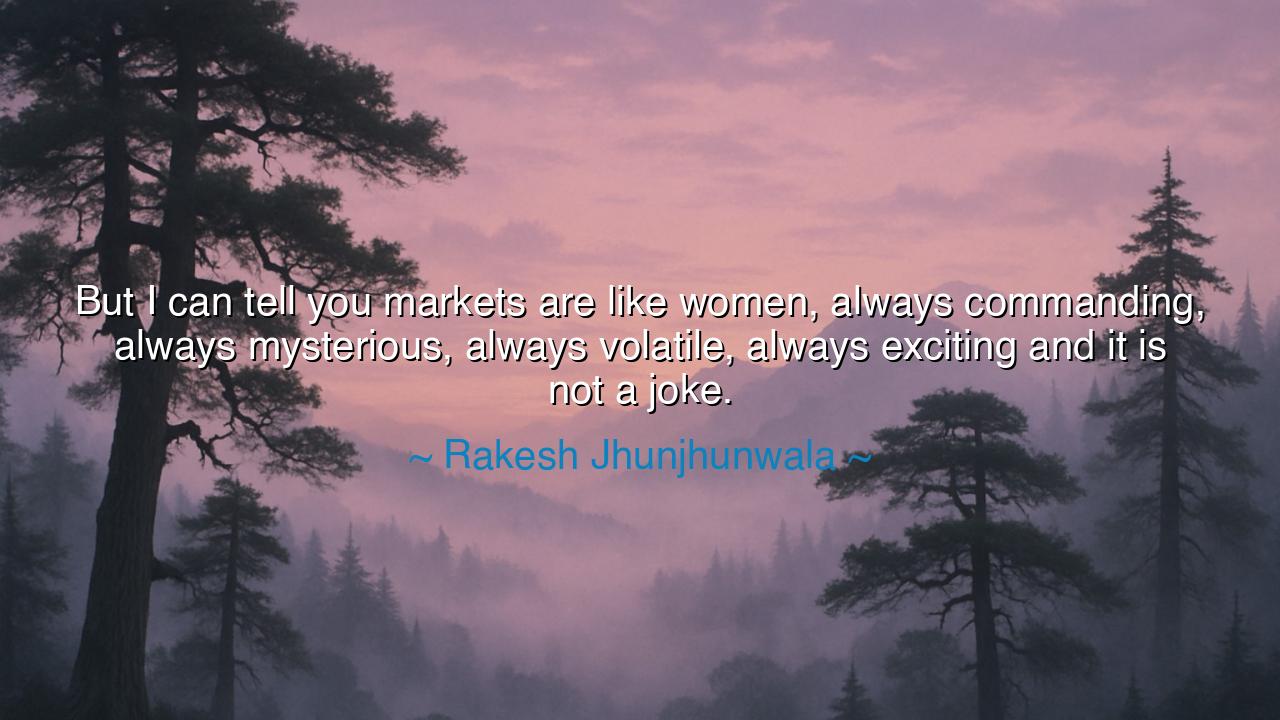
But I can tell you markets are like women, always commanding
But I can tell you markets are like women, always commanding, always mysterious, always volatile, always exciting and it is not a joke.






The words of Rakesh Jhunjhunwala, “But I can tell you markets are like women, always commanding, always mysterious, always volatile, always exciting and it is not a joke,” are spoken with the wit of a trader and the reverence of a philosopher. In them lies a comparison that turns the world of finance into the language of life: the markets, like women, cannot be fully conquered, controlled, or understood, yet they draw the heart with their power, their rhythm, and their unpredictable beauty.
In the ancient spirit, this saying reflects a truth recognized by sages: that some forces in life are not to be mastered, but to be respected. The market, like the sea, has moods of calm and storm. To enter it is to step into mystery, where wisdom lies not in certainty, but in humility before its ever-changing tides. Jhunjhunwala likens this mystery to that of women, who through history have been seen as embodiments of both allure and enigma, capable of commanding devotion and fear alike.
History bears witness in the tale of the Tulip Mania of the seventeenth century, when Dutch traders, swept up by passion and greed, treated tulip bulbs as treasures worth fortunes. Prices soared, then collapsed in ruin. The markets, like a mysterious beloved, gave ecstasy and then heartbreak. To those who thought they could tame her, she revealed her volatility. Yet to those who respected her nature, she remained a source of enduring fascination.
Jhunjhunwala’s words also carry a lesson of caution and wonder. To call the markets exciting is not to deny their danger, but to acknowledge the fire they ignite in the human spirit—the gamble, the hope, the despair, the triumph. Like the dance of love, the dance of trade is not for the faint of heart. One who enters it must be prepared for uncertainty, for joy and sorrow interwoven, for mystery that no chart or formula can fully explain.
So let this wisdom endure: both women and markets stand as symbols of life’s great forces—commanding, volatile, and beyond full comprehension. They remind us that not everything that rules us can be mastered, and not everything mysterious should be feared. Jhunjhunwala’s words are both playful and profound: a teaching that reverence, respect, and humility are the true keys to surviving the storms of both love and commerce. For in the end, the mystery itself is the source of the excitement.






AT38.Tran Vo Anh Thu
While it's clear that Rakesh Jhunjhunwala is aiming to portray markets as dynamic and ever-changing, the analogy to women feels outdated and risky. Could the same idea have been communicated without invoking gender stereotypes? It’s a reminder that even well-intentioned metaphors can unintentionally reinforce harmful societal views. How can we discuss market volatility in a way that respects all people?
NDnam nguyen duy
Markets do have their ups and downs, and they can be exciting, just like this quote says. However, is it really fair or accurate to liken markets to women in a way that might perpetuate damaging stereotypes? Could this comparison lead to misunderstandings about both economics and gender, or is it just a figure of speech that we shouldn’t overanalyze?
VTVienan Thpt
On one hand, the quote does highlight the dynamic and unpredictable characteristics of markets. But using a gendered analogy seems unnecessary and potentially harmful. Could there be a better way to describe market behavior without reinforcing stereotypes that have historically been used to diminish the value of women’s experiences or qualities?
NHnguyen ha
I understand the point Rakesh Jhunjhunwala is trying to make about the volatile nature of markets, but does the metaphor trivialize the complexities of women’s lives? The excitement of financial markets is one thing, but do we risk oversimplifying both women and market behavior by making such sweeping generalizations? Could there be a more respectful, yet equally impactful, analogy?
QQuan
While the quote captures the unpredictable and exciting nature of markets, it risks reducing women to mere metaphors for chaos and mystery. Shouldn’t we challenge such comparisons that use gendered stereotypes to describe something as neutral as markets? How could the message be rephrased to convey the same meaning without resorting to such gendered language?